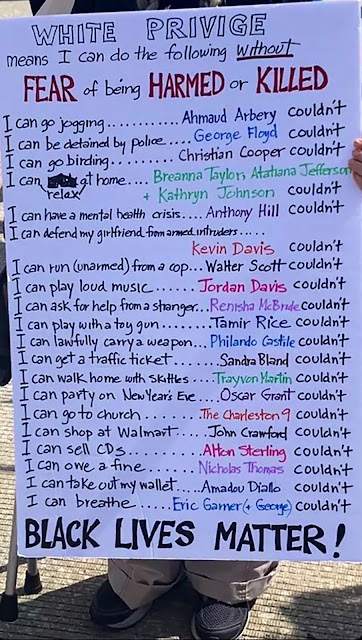Wait! That wasn't the question at the top of your mind?
Actually, it wasn't my first question, either (although I do have answers). When I originally learned about the movement to abolish the police, my first question was why would we do that?
 |
| Learn more about Jan's XK9 Books on her website. She writes science fiction police procedurals about sapient police dogs on a space station. Cover artwork for The Other Side of Fear is © 2020 by Lucy A. Synk; Cover artwork for What’s Bred in the Bone is © 2019 by Jody A. Lee |
Actually, it wasn't my first question, either (although I do have answers). When I originally learned about the movement to abolish the police, my first question was why would we do that?
Then I realized that by asking that question I had already marked myself as a person who owns property and benefits from white privilege.
Clearly, there was a disconnect happening. I needed to remedy it by educating myself.
Why would we abolish the police?
Let's start with my "Why would we abolish the police?" question. The answer depends on why the questioner thinks the police exist. Well, their motto is "to protect and serve." But protect what? Serve whom? That's where it starts to get dicey.
 |
| (Meme courtesy of Cheezeburger.) |
Functionally, throughout their history police forces have existed to protect the property and persons of some of the people from basically everyone else (except when they don't protect property or the personal safety of civilians). And in recent days we've heard many authorities cite "protecting property from destruction" as a reason for cracking down on protesters who linger past curfews.
They also don't exist to protect public safety in all the ways we tend to believe they do. Did you know that according to the Supreme Court, the police are not obligated to protect a person from physical harm, even when it is threatened?
Above all, they primarily exist to serve the current power structure, for well or ill. And that's a big part of the problem. If you have a racist or corrupt power structure, police exist to support it.
 |
| Minneapolis police advance through tear gas on a group of protesters. (Photo courtesy of Scott Olson/Getty Images, via NPR). |
Do we have a racist or corruptible power structure in the USA?
I feel kind of silly, even writing that question. Of course we do.
We certainly have a racist power structure in the USA. If anyone can have lived through the last several years and still doubt that, they probably live in a gated community, are relatively wealthy, white, and only watch Fox News. In other words, they very carefully tune out many distressing aspects of reality.
But you can't close your eyes, cover your ears, yell "La-la-la-la!" and magically transport yourself into a post-racial America. No such place exists.
Do we have a corruptible power structure in the USA? A look at the situation in Ferguson, MO, in 2014 offers a window on such a power structure. It was a community mostly run by the minority population of white people, with a mostly white police force. Racial profiling led to repeated arrests for petty infractions, and jail time when fines weren't paid. The city basically criminalized poverty, as well as driving or doing almost any other action while black.
 |
| The most discouraging part? This list only hits the "famous ones." (photo courtesy of KISS). |
But wait! The police are the "good guys!" Right?
Well, they're certainly supposed to be. Both in real life and in our media, they're portrayed as (and quite often are) brave, self-sacrificing, and strong protectors of the weak or vulnerable.
 |
| The District of Columbia has been at the forefront of the "community policing" effort. But is it enough? Many don't think so. (Photo courtesy of Governing) |
But again, whether you view them as good guys or not depends on your experiences. After some of the experiences and understandings explored in this blog post, you may be starting to feel less happy with the police.
But . . . abolish the police? Entirely? Is that realistic? And is it even remotely desirable? Don't we actually need the police for a lot of important things?
What about murders? What about armed robbery? Car theft? Rape? Human trafficking? Fraud? How would we deal with those things, if there were no police? I have yet to find comprehensive answers from the "abolish" advocates, other than promoting a decentralized approach that parcels out some duties to other agencies.
But unpacking many of the angles will take at least another blog post or so. I'm looking forward to examining how the "abolish" and "defund" advocates may turn out to inform (or not) the process of reforming, reducing or in some cases completely dismantling the ways policing is done--as well as implications for the future (both ours in reality, and in my science fiction).
IMAGE CREDITS:
The covers of Jan's books are from her website. The meme about protecting and serving "the right way" is from Cheezeburger. The photo of the cops and the tear gas is courtesy of Scott Olson/Getty Images, via NPR. The very long list of unsafe things to do "while black" is from KISS, and the photo of the officer doing "community policing" is from Governing. Many thanks to all!
No comments:
Post a Comment